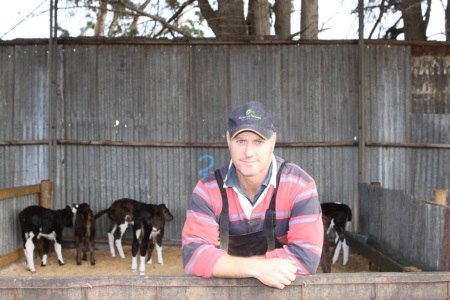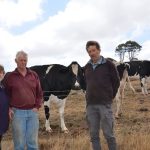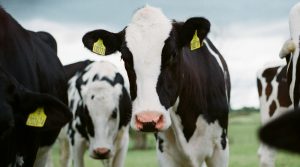
Power outages in the south-west Victoria cost dairy farmers without generator backup thousands of dollars a year in lost production.
Carlie Barry, Woolvie Jerseys and Holsteins, Cobden, Vic, said the farm had experienced several outages in the past fortnight.
“Our cell count is still recovering from last week’s outage, it went from 145,000 to 1,104,000, and it’s still high,” Ms Barrie said.
She said cows had been stuck in the dairy until late on Monday.
Bulk milk cell count is an indirect measure of subclinical mastitis in a dairy herd.
One outage last year resulted in 20 fresh cows contracting mastitis.
“We’ve been farming over this way for about four years, and each year it’s getting worse,” Ms Barrie said.
“There are more frequent outages and the power is staying out for longer.”
Ms Barrie and husband Owen lease two farms and have just bought another one.
“It hasn’t been financially viable for us to put a generator, but for each farm, when we can’t milk for 24 hours, it costs us $1000 in lost production,” she said.
Power cuts had also resulted in equipment malfunction, which cost money to replace.
“We don’t want any more airy-fairy media releases with no action,” Ms Barrie said.
“This power situation isn’t going to change in the short term by having ‘feel good kumbuyas’ and coffee with government.”
Donna Edge, Carpendeit, Vic, said she’d also been affected by load shedding and power outages that swept through the region last week.
“The power was out for five hours; I didn’t finish milking until 11pm,” she said.
“We don’t have any backup, as we haven’t needed it over the years.
“It hadn’t been going off that often. If it was off, it only meant delays of an hour or two in milking.
“It’s not the linesmen. There are not the crews to repair the breakages.”
Certainty required
South Purumbete, Vic, farmer Adam Jenkins said whether the power cuts were due to load shedding, maintenance or lightning strikes, dairy farmers needed certainty.
He said larger farms required greater returns on investment, but couldn’t grow while power was unreliable.
Livestock needed water, and energy was required to run equipment and cool milk vats.
“If we are being cut off, it’s totally unacceptable,” Mr Jenkins said.
“It’s about time the politicians had some sort of bipartisan approach to get the energy situation sorted out.
“People want cheap food, but power costs are going up, and service and reliability are going down, and that’s unacceptable.”
Long-term, sustainable solutions were required for energy, if people were going to invest.
Load shedding was “spasmodic”.
“Years ago, primary production, and in particular dairy, was well up the chain when it came to being looked after, before they turned the power off,” he said.
Farmers were interested in self-sufficiency, but that would cost money.
“People are going to have to pay more for our products,” Mr Jenkins said.
“We’re happy to look at it, but we have to push the price up the chain, so we can make a profit to invest in those solutions.”
Last resort
Energy Minister Lily D’Ambrosio said the government understood the impact power outages could have on businesses and farmers in particular.
She said load shedding was a last resort, and only undertaken to prevent extensive power outages and damage to infrastructure.
“The loss of supply we saw during the heatwave in January is why our huge investment in new energy supply is crucial,” Ms D’Ambrosio said.
“It shows why our Solar Homes program, battery storage initiatives and renewable energy targets are so desperately needed — they will boost the supply of reliable, affordable, clean energy, helping to protect us during extreme weather events.”
She said the government was also helping farmers better manage energy costs by providing expert advice and opportunities to improve efficiency while investing in new technology with the $30 million Agricultural Energy Investment Plan.
The plan aimed to cut costs for farmers and help them realise how they could make a more sustainable and adaptable farm sector.
A PowerCor spokeswoman said the company had increased employee numbers throughout south-west Victoria in the past five years.
Lightning struck part of the network last week.
The spokeswoman said 7444 lightning strikes were recorded within a 150km radius of Terang, Vic, from 12pm Tuesday to early Wednesday last week.
“When lightning hits our assets, it can cause extensive damage or cause fuses to activate as designed,” she said.
“Given the large number of faults, restoration times were longer than usual.
“Extra crews were mobilised from other areas to assist in repairing the damage.”
On Monday afternoon, a safety device on Powercor’s network operated and shut off power to about 1763 customers in the Camperdown, Vic, area.
“This device activates when an object makes contact with a powerline and is designed to reduce the risk of fires,” the spokeswoman said.
Crews patrolled the line and restored power within one-and-a-half hours.
A Fonterra spokeswoman acknowledged power outages were experiencing milk quality issues and the company was working with them.
























